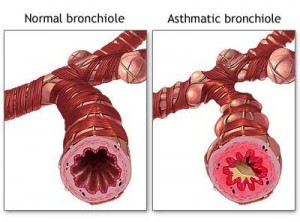The treatment of chronic asthma
Acute asthma is responsible for 2 million emergency department (ED) visits and nearly 500,000 hospital admissions in the United States annually. Although most patients improve enough to be discharged from the ED after treatment, such improvement does not signify complete recovery. Often, asthma symptoms will persist for days or weeks. Moreover, relapse after the acute asthma episode, requiring either urgent asthma treatment or hospitalization, is common. Relapse rates ranging from 10% within 7 days after ED discharge to 31% 10 to 21 days after ED discharge have been reported. 
Cysteinyl leukotrienes have been shown to be mediators of inflammation and bronchoconstriction in asthma patients, and marked elevations of these compounds may occur during acute asthma epi-sodes. Evidence supports the use of leukotriene-modifying drugs in the treatment of chronic asthma, and a number of studies have indicated potential benefit in patients with acute asthma. The effects of this drug class on relapse after an acute asthma episode have not yet been described.
Officlial Canadian Pharmacy website: goo.gl/lavRKP
Treatment guidelines include therapy with systemic corticosteroids and inhaled (32-agonists as ED treatment for acute asthma, and a course of oral corticosteroids after ED discharge to prevent re-lapse. Nevertheless, high ED admission and relapse rates persist. Findings that corticosteroids do little to decrease the production of cysteinyl leukotrienes after allergen challenges, that the beneficial effects of leukotriene-modifying agents are additive to inhaled (32-agonists, and that the bronchodilatory effects of (32-agonists may diminish during asthma exacerbation suggest that there may be a role for leukotriene-modifying agents in the current ED treatment of asthma.
In this multicenter trial, we studied the effect of zafirlukast, an oral leukotriene receptor antagonist (LTRA), when added to standardized care in a population of patients who presented to the ED with acute asthma. The main objective was to assess the effects of zafirlukast on relapse after discharge from the ED. Other assessments included the rate of extended care before ED discharge, and treatment effects on pulmonary function, symptoms, and other patient outcomes in both the ED and outpatient periods.
Cool Pinterest profile!) see now